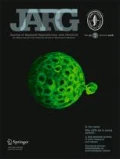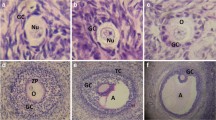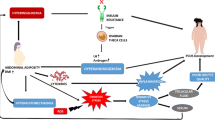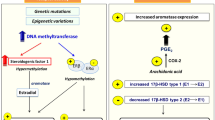Abstract
Objectives
Management options for PCOS, as the most prevalent endocrine disorder in women of reproductive age, using natural supplements have a high priority for physicians, especially based on the etiological pathways. Therefore, this study was conducted to describe the effect of resveratrol on the angiogenesis pathway, for management of PCOS through assessing VEGF, HIF1 gene expression, and laboratory parameters.
Methods
In this triple-blind RCT, PCOS was confirmed in ICSI candidates based on the Rotterdam criteria. Sixty-two patients that met the inclusion criteria were randomly assigned to two groups. All patients took resveratrol 800 mg/day or placebo for 40 days orally from the beginning of their previous menstruation cycle until the oocyte retrieval day. The serum levels of different hormones were measured, and the expression of HIF1 & VEGF genes was quantified by real-time PCR.
Results
As for the laboratory hormone assay in 61 PCOS patients, a significant mean difference was seen in the FSH, LH, TSH, and testosterone between the two groups (P < 0.05). The results showed a reduction in the expression of VEGF & HIF1 genes under the effect of resveratrol in the granulosa cells (P = 0.0001). The number of mature oocytes, cleavage rate, fertilization rate, and fertility rate were not significantly different between the two groups (P > 0.05), but the high-quality oocyte rate and high-quality embryo rate were higher in the resveratrol group (P < 0.05).
Conclusions
Based on the results, resveratrol may improve some outcomes of PCOS patients, probably through changing the serum levels of some sex hormones and expression of VEGF & HIF1 genes in the angiogenesis pathway of granulosa cells.





Similar content being viewed by others
References
Rotterdam EA-SPcwg. Revised 2003 consensus on diagnostic criteria and long-term health risks related to polycystic ovary syndrome (PCOS). Hum Reprod 2004;19(1):41–47.
Teede HJ, Misso ML, Costello MF, Dokras A, Laven J, Moran L, et al. Recommendations from the international evidence-based guideline for the assessment and management of polycystic ovary syndrome. Hum Reprod. 2018;33(9):1602–18. https://doi.org/10.1093/humrep/dey256.
Goodarzi MO, Dumesic DA, Chazenbalk G, Azziz R. Polycystic ovary syndrome: etiology, pathogenesis and diagnosis. Nat Rev Endocrinol. 2011;7(4):219–31. https://doi.org/10.1038/nrendo.2010.217.
Lizneva D, Suturina L, Walker W, Brakta S, Gavrilova-Jordan L, Azziz R. Criteria, prevalence, and phenotypes of polycystic ovary syndrome. Fertil Steril. 2016;106(1):6–15. https://doi.org/10.1016/j.fertnstert.2016.05.003.
Christensen SB, Black MH, Smith N, Martinez MM, Jacobsen SJ, Porter AH, et al. Prevalence of polycystic ovary syndrome in adolescents. Fertil Steril. 2013;100(2):470–7. https://doi.org/10.1016/j.fertnstert.2013.04.001.
Tannus S, Tan J, Son WY, Dahan MH. Prevalence, clinical characteristics, and reproductive outcomes of polycystic ovary syndrome in older women referred for tertiary fertility care. Arch Gynecol Obstet. 2018;297(4):1037–42. https://doi.org/10.1007/s00404-017-4642-z.
Alexiou E, Hatziagelaki E, Pergialiotis V, Chrelias C, Kassanos D, Siristatidis C, et al. Hyperandrogenemia in women with polycystic ovary syndrome: prevalence, characteristics and association with body mass index. Horm Mol Biol Clin Invest. 2017;29(3):105–11. https://doi.org/10.1515/hmbci-2016-0047.
Di Pietro M, Pascuali N, Parborell F, Abramovich D. Ovarian angiogenesis in polycystic ovary syndrome. Reproduction. 2018;155(5):R199–209. https://doi.org/10.1530/REP-17-0597.
Peitsidis P, Agrawal R. Role of vascular endothelial growth factor in women with PCO and PCOS: a systematic review. Reprod BioMed Online. 2010;20(4):444–52. https://doi.org/10.1016/j.rbmo.2010.01.007.
Artini PG, Monti M, Cristello F, Matteucci C, Bruno S, Valentino V, et al. Vascular endothelial growth factor in females of reproductive age. Gynecol Endocrinol. 2003;17(6):477–92.
Ben Salem A, Megdich F, Kacem O, Souayeh M, Hachani Ben Ali F, Hizem S, et al. Vascular endothelial growth factor (VEGFA) gene variation in polycystic ovary syndrome in a Tunisian women population. BMC Genomics. 2016;17(Suppl 9):748. https://doi.org/10.1186/s12864-016-3092-5.
Kudsy M, Alhalabi M, Al-Quobaili F. Follicular fluid vascular endothelial growth factor (VEGF) could be a predictor for pregnancy outcome in normo-responders and polycystic ovary syndrome women undergoing IVF/ICSI treatment cycles. Middle East Fertil Soc J. 2016;21(1):52–6. https://doi.org/10.1016/j.mefs.2015.11.001.
Meek CL, Bravis V, Don A, Kaplan F. Polycystic ovary syndrome and the differential diagnosis of hyperandrogenism. Obstet Gynaecol. 2013;15(3):171–6. https://doi.org/10.1111/tog.12030.
Lebbe M, Woodruff TK. Involvement of androgens in ovarian health and disease. Mol Hum Reprod. 2013;19(12):828–37. https://doi.org/10.1093/molehr/gat065.
Forsythe JA, Jiang BH, Iyer NV, Agani F, Leung SW, Koos RD, et al. Activation of vascular endothelial growth factor gene transcription by hypoxia-inducible factor 1. Mol Cell Biol. 1996;16(9):4604–13.
De Leo V, Musacchio MC, Cappelli V, Massaro MG, Morgante G, Petraglia F. Genetic, hormonal and metabolic aspects of PCOS: an update. Reprod Biol Endocrinol. 2016;14(1):38. https://doi.org/10.1186/s12958-016-0173-x.
Wang F, Tian X, Zhang L, He C, Ji P, Li Y, et al. Beneficial effect of resveratrol on bovine oocyte maturation and subsequent embryonic development after in vitro fertilization. Fertil Steril. 2014;101(2):577–86.e1. https://doi.org/10.1016/j.fertnstert.2013.10.041.
Liu MJ, Sun AG, Zhao SG, Liu H, Ma SY, Li M, et al. Resveratrol improves in vitro maturation of oocytes in aged mice and humans. Fertil Steril. 2018;109(5):900–7. https://doi.org/10.1016/j.fertnstert.2018.01.020.
Kwak SS, Cheong SA, Jeon Y, Lee E, Choi KC, Jeung EB, et al. The effects of resveratrol on porcine oocyte in vitro maturation and subsequent embryonic development after parthenogenetic activation and in vitro fertilization. Theriogenology. 2012;78(1):86–101. https://doi.org/10.1016/j.theriogenology.2012.01.024.
Furat Rencber S, Kurnaz Ozbek S, Eraldemir C, Sezer Z, Kum T, Ceylan S, et al. Effect of resveratrol and metformin on ovarian reserve and ultrastructure in PCOS: an experimental study. J Ovarian Res. 2018;11(1):55. https://doi.org/10.1186/s13048-018-0427-7.
Asghari S, Rafraf M, Farzin L, Asghari-Jafarabadi M, Ghavami SM, Somi MH. Effects of pharmacologic dose of resveratrol supplementation on oxidative/antioxidative status biomarkers in nonalcoholic fatty liver disease patients: a randomized, double-blind, placebo-controlled trial. Adv Pharm Bull. 2018;8(2):307–17. https://doi.org/10.15171/apb.2018.036.
Jimoh A, Tanko Y, Ahmed A, Mohammed A, Ayo JO. Resveratrol prevents high-fat diet-induced obesity and oxidative stress in rabbits. Pathophysiology. 2018;25:359–64. https://doi.org/10.1016/j.pathophys.2018.07.003.
Seyyedebrahimi S, Khodabandehloo H, Nasli Esfahani E, Meshkani R. Correction to: the effects of resveratrol on markers of oxidative stress in patients with type 2 diabetes: a randomized, double-blind, placebo-controlled clinical trial. Acta Diabetol. 2018. https://doi.org/10.1007/s00592-018-1160-9.
Ghowsi M, Khazali H, Sisakhtnezhad S. The effect of resveratrol on oxidative stress in the liver and serum of a rat model of polycystic ovary syndrome: an experimental study. Int J Reprod Biomed (Yazd). 2018;16(3):149–58.
Oh WY, Shahidi F. Antioxidant activity of resveratrol ester derivatives in food and biological model systems. Food Chem. 2018;261:267–73. https://doi.org/10.1016/j.foodchem.2018.03.085.
Khojah HM, Ahmed S, Abdel-Rahman MS, Elhakeim EH. Resveratrol as an effective adjuvant therapy in the management of rheumatoid arthritis: a clinical study. Clin Rheumatol. 2018;37(8):2035–42. https://doi.org/10.1007/s10067-018-4080-8.
Banaszewska B, Wrotynska-Barczynska J, Spaczynski RZ, Pawelczyk L, Duleba AJ. Effects of resveratrol on polycystic ovary syndrome: a double-blind, randomize,Placebo-controlled Trial. J Clin Endocrinol Metab. 2016;101(11):4322–8. https://doi.org/10.1210/jc.2016-1858.
Aquino CI, Nori SL. Complementary therapy in polycystic ovary syndrome. Transl Med UniSa. 2014;9:56–65.
Ortega I, Wong DH, Villanueva JA, Cress AB, Sokalska A, Stanley SD, et al. Effects of resveratrol on growth and function of rat ovarian granulosa cells. Fertil Steril. 2012;98(6):1563–73. https://doi.org/10.1016/j.fertnstert.2012.08.004.
Palsamy P, Subramanian S. Ameliorative potential of resveratrol on proinflammatory cytokines, hyperglycemia mediated oxidative stress, and pancreatic beta-cell dysfunction in streptozotocin-nicotinamide-induced diabetic rats. J Cell Physiol. 2010;224(2):423–32. https://doi.org/10.1002/jcp.22138.
Yan F, Sun X, Xu C. Protective effects of resveratrol improve cardiovascular function in rats with diabetes. Exp Ther Med. 2018;15(2):1728–34. https://doi.org/10.3892/etm.2017.5537.
Yu HB, Zhang HF, Zhang X, Li DY, Xue HZ, Pan CE, et al. Resveratrol inhibits VEGF expression of human hepatocellular carcinoma cells through a NF-kappa B-mediated mechanism. Hepatogastroenterology. 2010;57(102–103):1241–6.
Cao Z, Fang J, Xia C, Shi X, Jiang BH. Trans-3,4,5′-trihydroxystibene inhibits hypoxia-inducible factor 1alpha and vascular endothelial growth factor expression in human ovarian cancer cells. Clin Cancer Res. 2004;10(15):5253–63. https://doi.org/10.1158/1078-0432.CCR-03-0588.
Chatterjee A, Ronghe A, Padhye SB, Spade DA, Bhat NK, Bhat HK. Antioxidant activities of novel resveratrol analogs in breast cancer. J Biochem Mol Toxicol. 2018;32(1). https://doi.org/10.1002/jbt.21925.
Li Y, Liu Y, Lu Y, Zhao B. Inhibitory effects of 17beta-estradiol or a resveratrol dimer on hypoxia-inducible factor-1alpha in genioglossus myoblasts: involvement of ERalpha and its downstream p38 MAPK pathways. Int J Mol Med. 2017;40(5):1347–56. https://doi.org/10.3892/ijmm.2017.3123.
Wallerath T, Deckert G, Ternes T, Anderson H, Li H, Witte K, et al. Resveratrol, a polyphenolic phytoalexin present in red wine, enhances expression and activity of endothelial nitric oxide synthase. Circulation. 2002;106(13):1652–8.
Mokhtar S, Sadeghi MR, Akhondi MM, Zafardoust S, Badenush B, Fatemi F, et al. ART outcomes in GnRH antagonist protocol (flexible) and long GnRH agonist protocol during early follicular phase in patients with polycystic ovary syndrome: a randomized clinical trial. J Reprod Infertil. 2015;16(3):148–54.
Rajashekar L, Krishna D, Patil M. Polycystic ovaries and infertility: our experience. J Hum Reprod Sci. 2008;1(2):65–72.
Sattarinezhad A, Roozbeh J, Shirazi Yeganeh B, Omrani GR, Shams M. Resveratrol reduces albuminuria in diabetic nephropathy: a randomized double-blind placebo-controlled clinical trial. Diabetes Metab. 2019;45:53–9. https://doi.org/10.1016/j.diabet.2018.05.010.
Ozgur S, Oktem M, Altinkaya SO, Oktem EO, Cenksoy C, Erdem O, et al. The effects of resveratrol on ovarian hyperstimulation syndrome in a rat model. Taiwan J Obstet Gynecol. 2018;57(3):383–8. https://doi.org/10.1016/j.tjog.2018.04.010.
Rauf A, Imran M, Butt MS, Nadeem M, Peters DG, Mubarak MS. Resveratrol as an anti-cancer agent: a review. Crit Rev Food Sci Nutr. 2018;58(9):1428–47. https://doi.org/10.1080/10408398.2016.1263597.
Kasdallah-Grissa A, Mornagui B, Aouani E, Hammami M, El May M, Gharbi N, et al. Resveratrol, a red wine polyphenol, attenuates ethanol-induced oxidative stress in rat liver. Life Sci. 2007;80(11):1033–9. https://doi.org/10.1016/j.lfs.2006.11.044.
Labinskyy N, Csiszar A, Veress G, Stef G, Pacher P, Oroszi G, et al. Vascular dysfunction in aging: potential effects of resveratrol, an anti-inflammatory phytoestrogen. Curr Med Chem. 2006;13(9):989–96.
Mahal HS, Mukherjee T. Scavenging of reactive oxygen radicals by resveratrol: antioxidant effect. Res Chem Intermed. 2006;32(1):59–71. https://doi.org/10.1163/156856706775012941.
Lazzaroni-Tealdi E, Barad DH, Albertini DF, Yu Y, Kushnir VA, Russell H, et al. Oocyte scoring enhances embryo-scoring in predicting pregnancy chances with IVF where it counts Most. PLoS One. 2015;10(12):e0143632. https://doi.org/10.1371/journal.pone.0143632.
Rienzi L, Balaban B, Ebner T, Mandelbaum J. The oocyte. Hum Reprod. 2012;27(suppl_1):i2–i21. https://doi.org/10.1093/humrep/des200.
Hershko-Klement A, Rovner E, Yekutieli D, Ghetler Y, Gonen O, Cohen I, et al. Embryo quality and implantation rates are not influenced by total motile count values in an ICSI programme: a novel point of view. Int J Mol Epidemiol Genet. 2012;3(3):205–12.
Alpha Scientists in Reproductive M, Embryology ESIGo. The Istanbul consensus workshop on embryo assessment: proceedings of an expert meeting. Hum Reprod. 2011;26(6):1270–83. https://doi.org/10.1093/humrep/der037.
Rizk B, Aboulghar MA. Classification, pathophysiology and management of ovarian hyperstimulation syndrome. In: Pe B, editor. In-vitro fertilization and assisted reproduction. New York, London: The Parthenon Publishing Group; 1999. p. 131–55.
Ron-El R, Raziel A, Schachter M, Strassburger D, Kasterstein E, Friedler S. Induction of ovulation after gnRH antagonists. Hum Reprod Update. 2000;6(4):318–21.
Duleba A, Spaczynski RZ, Pawelczyk L. Effects of resveratrol on polycystic ovary syndrome. Fertil Steril. 2016;106,3(Supplement):e36.
Kjaer TN, Ornstrup MJ, Poulsen MM, Jorgensen JO, Hougaard DM, Cohen AS, et al. Resveratrol reduces the levels of circulating androgen precursors but has no effect on, testosterone, dihydrotestosterone, PSA levels or prostate volume. A 4-month randomised trial in middle-aged men. Prostate. 2015;75(12):1255–63. https://doi.org/10.1002/pros.23006.
Ergenoglu M, Yildirim N, Yildirim AG, Yeniel O, Erbas O, Yavasoglu A, et al. Effects of resveratrol on ovarian morphology, plasma anti-Mullerian hormone, IGF-1 levels, and oxidative stress parameters in a rat model of polycystic ovary syndrome. Reprod Sci. 2015;22(8):942–7. https://doi.org/10.1177/1933719115570900.
Giuliani C, Iezzi M, Ciolli L, Hysi A, Bucci I, Di Santo S, et al. Resveratrol has anti-thyroid effects both in vitro and in vivo. Food Chem Toxicol. 2017;107(Pt A):237–47. https://doi.org/10.1016/j.fct.2017.06.044.
Duntas LH. Resveratrol and its impact on aging and thyroid function. J Endocrinol Investig. 2011;34(10):788–92. https://doi.org/10.3275/7926.
Wong DH, Villanueva JA, Cress AB, Sokalska A, Ortega I, Duleba AJ. Resveratrol inhibits the mevalonate pathway and potentiates the antiproliferative effects of simvastatin in rat theca-interstitial cells. Fertil Steril. 2011;96(5):1252–8. https://doi.org/10.1016/j.fertnstert.2011.08.010.
Kyselova V, Peknicova J, Buckiova D, Boubelik M. Effects of p-nonylphenol and resveratrol on body and organ weight and in vivo fertility of outbred CD-1 mice. Reprod Biol Endocrinol. 2003;1:30.
Stelzer G, Rosen N, Plaschkes I, Zimmerman S, Twik M, Fishilevich S, et al. The GeneCards suite: from gene data mining to disease genome sequence analyses. Curr Protoc Bioinformatics. 2016;54(1 30):1–1 3. https://doi.org/10.1002/cpbi.5.
Mitani T, Harada N, Tanimori S, Nakano Y, Inui H, Yamaji R. Resveratrol inhibits hypoxia-inducible factor-1alpha-mediated androgen receptor signaling and represses tumor progression in castration-resistant prostate cancer. J Nutr Sci Vitaminol (Tokyo). 2014;60(4):276–82.
Zhang M, Li W, Yu L, Wu S. The suppressive effect of resveratrol on HIF-1alpha and VEGF expression after warm ischemia and reperfusion in rat liver. PLoS One. 2014;9(10):e109589. https://doi.org/10.1371/journal.pone.0109589.
Acknowledgements
This work was financially supported by the Research Deputy of Tehran University of Medical Sciences (Grant Number 94-02-30-29469). The biological material was kindly provided by Omid IVF Center.
Author information
Authors and Affiliations
Corresponding author
Ethics declarations
Conflict of interest
The authors declare that they have no conflicts of interest.
Additional information
Publisher’s note
Springer Nature remains neutral with regard to jurisdictional claims in published maps and institutional affiliations.
Electronic supplementary material
ESM 1
(PDF 483 kb)
Rights and permissions
About this article
Cite this article
Bahramrezaie, M., Amidi, F., Aleyasin, A. et al. Effects of resveratrol on VEGF & HIF1 genes expression in granulosa cells in the angiogenesis pathway and laboratory parameters of polycystic ovary syndrome: a triple-blind randomized clinical trial. J Assist Reprod Genet 36, 1701–1712 (2019). https://doi.org/10.1007/s10815-019-01461-6
Received:
Accepted:
Published:
Issue Date:
DOI: https://doi.org/10.1007/s10815-019-01461-6




